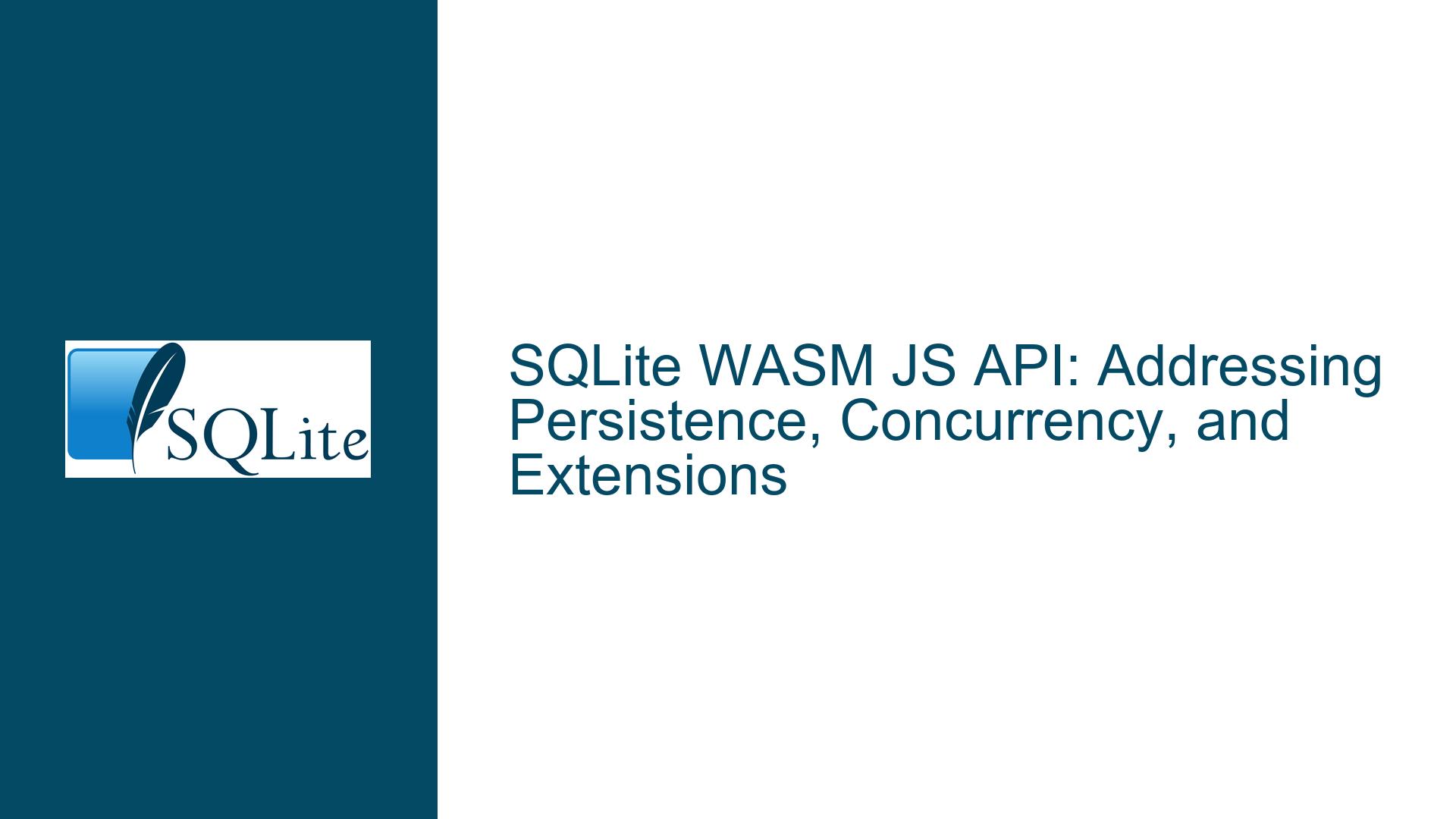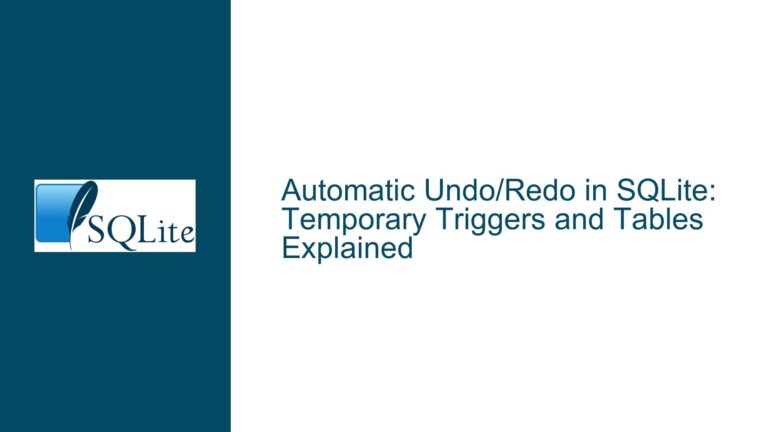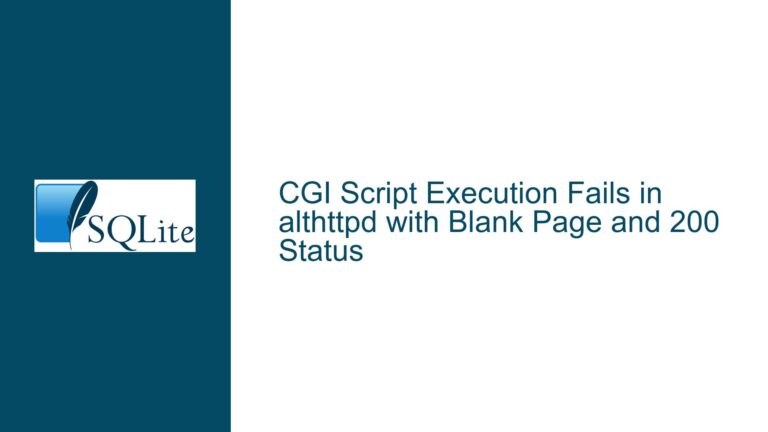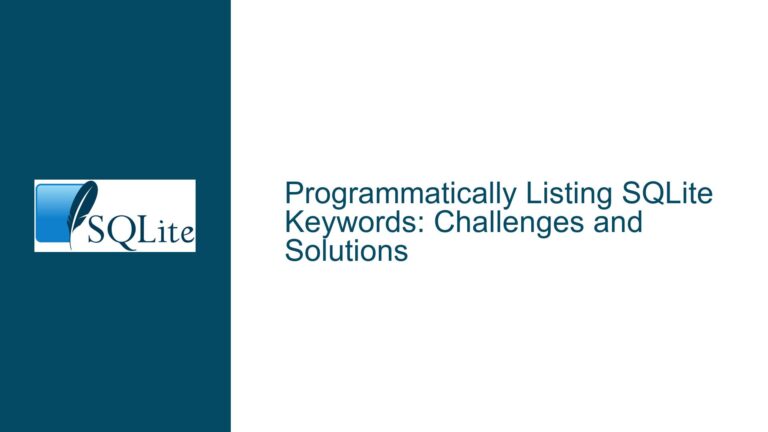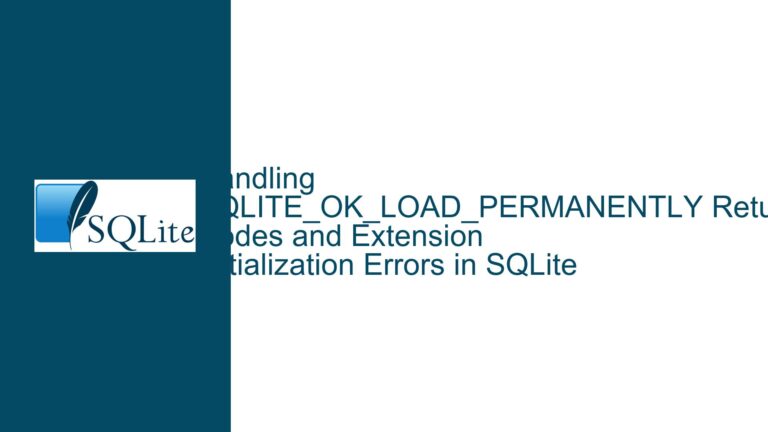SQLite WASM JS API: Addressing Persistence, Concurrency, and Extensions
Challenges in Implementing Robust Client-Side Databases with SQLite WASM
The integration of SQLite into browser environments via WebAssembly (WASM) introduces unique technical challenges that impact its adoption for web applications requiring client-side data management. Three primary areas of concern emerge from the forum discussion:
- Persistence Mechanisms
- Concurrency in Multi-Tab Environments
- Extensibility via Runtime-Loadable Modules
Persistence Mechanisms
The SQLite WASM implementation leverages the Origin Private File System (OPFS) for durable storage, which provides synchronous file handles in modern browsers. However, OPFS support is inconsistent across platforms:
- Chromium-based browsers (Chrome, Edge) fully support synchronous access.
- Safari implements an older version of the OPFS specification, lacking critical synchronous methods.
- Firefox has not yet shipped OPFS support.
This fragmentation forces developers to seek fallback storage mechanisms like IndexedDB or localStorage, but these alternatives introduce trade-offs:
- IndexedDB is asynchronous, complicating integration with SQLite’s synchronous C API.
- localStorage and sessionStorage are limited to ~5MB per origin, making them unsuitable for larger datasets.
Concurrency in Multi-Tab Environments
SQLite’s default locking mechanisms clash with browser constraints. When multiple tabs or workers access the same OPFS-hosted database:
- The OPFS VFS uses file locks, but browser security models restrict cross-tab coordination.
- Without Web Locks API integration, concurrent writes risk corruption. Testing reveals that even 3–6 concurrent connections may trigger contention errors.
- The
unlock-asapflag mitigates this by releasing locks sooner, but incurs a 30–400% performance penalty depending on workload.
Extensibility via Runtime-Loadable Modules
Developers expect to extend SQLite with custom functions (e.g., cryptographic modules, geospatial libraries). However:
- WASM’s security model prohibits traditional dynamic linking (
dlopen()). - Extensions must be statically linked at build time, complicating workflows for non-C languages (e.g., Rust).
- The Emscripten toolchain’s symbol minification and indirect function table requirements further hinder third-party extensions.
Architectural and Browser-Layer Constraints Driving Limitations
Browser Storage API Fragmentation
The lack of uniform OPFS support stems from competing browser vendors’ priorities:
- Apple’s Safari delays adoption to protect its App Store revenue by limiting web app capabilities.
- Mozilla’s Firefox prioritizes other features over OPFS, though implementation is ongoing.
- Chromium’s dominance allows Google to drive OPFS adoption, but forces developers into Chrome-specific optimizations.
WASM Toolchain and Security Limitations
Dynamic Linking (dlopen)
- Emscripten’s
dlopen()requires modules to pre-declare all dependencies, making it impractical for extensions relying on non-exported SQLite internals. - Workarounds like static linking inflate binary sizes and complicate updates.
- Emscripten’s
Threading and Async Boundaries
- SQLite’s synchronous API conflicts with JavaScript’s async/await model.
- OPFS sync methods (e.g.,
getFile()) are still async in Chrome, forcing a worker thread abstraction that consumes 30%+ of runtime.
Build Toolchain Quirks
- Emscripten’s default symbol minification breaks external WASM module interactions.
- Stripping debug symbols (
wasm-strip) inadvertently removes dynamic linking metadata.
Concurrency Model Mismatches
- SQLite’s File Locking: Relies on POSIX-style advisory locks, which browsers emulate inconsistently.
- Web Locks API: A promising alternative but requires reimplementing SQLite’s VFS layer to use browser-managed locks. Projects like wa-sqlite demonstrate this approach but sacrifice performance.
Strategies for Optimizing SQLite WASM in Production Workloads
Persistence Workarounds and Polyfills
OPFS with Progressive Enhancement
- Detect OPFS support using
'getFile' in FileSystemFileHandle.prototype. - Fall back to IndexedDB via libraries like absurd-sql or wa-sqlite for unsupported browsers.
async function initializeDB() { if (typeof FileSystemFileHandle !== 'undefined') { // Use OPFS const root = await navigator.storage.getDirectory(); return await sqlite3.open_v2('opfs-db', { vfs: 'opfs' }); } else { // Fallback to IndexedDB const vfs = await import('wa-sqlite/src/VFS/IDBBatchVFS.js'); return await sqlite3.open_v2('idb-db', { vfs: 'idbbatch' }); } }- Detect OPFS support using
Manual Serialization to localStorage
- Use
sqlite3_js_db_export()to serialize databases toArrayBufferand compress them for localStorage.
function saveToLocalStorage(db, key) { const arrayBuffer = sqlite3_js_db_export(db); const compressed = zlib.deflateSync(arrayBuffer); localStorage.setItem(key, compressed.toString('base64')); }- Use
Concurrency Optimization Techniques
Web Locks API Integration
- Implement a custom VFS that acquires locks via
navigator.locks.request().
async function opfsWriteWithLock(fileHandle, buffer) { await navigator.locks.request('opfs-lock', async () => { const writable = await fileHandle.createWritable(); await writable.write(buffer); await writable.close(); }); }- Implement a custom VFS that acquires locks via
Connection Pooling
- Limit concurrent connections to 3–4 per origin and queue write operations.
class ConnectionPool { constructor(maxConnections) { this.queue = []; this.active = 0; this.max = maxConnections; } async exec(sql) { if (this.active >= this.max) { await new Promise(resolve => this.queue.push(resolve)); } this.active++; try { return await sqlite3.exec(sql); } finally { this.active--; this.queue.shift()?.(); } } }
Extending SQLite with Static Linking
Rust Extensions via Emscripten
- Compile Rust to WASM with
wasm32-unknown-emscriptentarget. - Link against SQLite’s amalgamation source.
#[no_mangle] pub extern "C" fn sqlite3_extension_init(db: *mut sqlite3) -> i32 { // Register custom functions }Build command:
emcc -o extension.wasm extension.rs -lsqlite3 -L/path/to/sqlite3.o- Compile Rust to WASM with
Emscripten Dynamic Linking Workflow
- Build SQLite as a side module with
-sMAIN_MODULE=2. - Load extensions via
dlopen()in a dedicated worker.
const sqlite3 = await import('sqlite3'); const extension = await sqlite3.loadExtension('/path/extension.wasm');- Build SQLite as a side module with
Binary Size Reduction
Aggressive WASM Optimization
- Apply
wasm-optwith-O4and Binaryen’s asyncify passes.
wasm-opt sqlite3.wasm -O4 -o sqlite3-opt.wasm brotli -Z sqlite3-opt.wasm- Apply
Emscripten Compiler Flags
- Use
-Ozfor size-optimized builds and-sENVIRONMENT=webto exclude Node.js polyfills.
emcc sqlite3.c -Oz -sENVIRONMENT=web -o sqlite3.js- Use
Monitoring Browser Support
- Track OPFS implementation status via Can I Use and vendor roadmaps.
- Advocate for synchronous OPFS methods in WebKit and Mozilla bug trackers.
By addressing these challenges through polyfills, concurrency controls, and build optimizations, developers can leverage SQLite WASM’s full potential while navigating browser-layer constraints.
